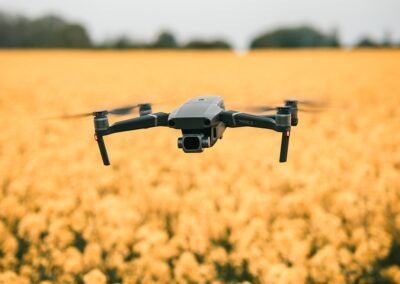Innovations in Sustainable Materials
The Emergence of Biodegradable and Compostable Alternatives
The integration of biodegradable and compostable materials into various industries marks a significant advancement in environmental sustainability. These innovative materials offer environmentally friendly alternatives to conventional plastics, addressing one of the most pressing environmental challenges of our time: plastic pollution. In rapidly developing regions like Saudi Arabia and the UAE, adopting sustainable materials is crucial for reducing the environmental impact of packaging and disposable products.
Biodegradable materials are designed to break down naturally through microbial activity, returning to the environment without leaving harmful residues. Compostable materials go a step further, breaking down into non-toxic components that enrich the soil, making them ideal for organic waste management. These materials can be used in a wide range of applications, from packaging and disposable utensils to agricultural products and medical supplies. By replacing conventional plastics with biodegradable and compostable alternatives, industries can significantly reduce their ecological footprint and contribute to a more sustainable future.
Moreover, the development of these materials is driven by advances in biotechnology and materials science. Researchers are continually exploring new ways to enhance the properties of biodegradable and compostable materials, making them more durable, versatile, and cost-effective. For example, innovations in biopolymers have led to the creation of materials that mimic the strength and flexibility of traditional plastics while being fully biodegradable. This progress ensures that sustainable materials can meet the diverse needs of various industries, promoting widespread adoption and reducing reliance on conventional plastics.
The Role of Technology in Advancing Sustainable Materials
Modern technology plays a crucial role in advancing the development and application of biodegradable and compostable materials. Artificial Intelligence (AI) and Blockchain are two key technologies that are enhancing the production, monitoring, and verification of these materials, ensuring their quality and sustainability.
AI algorithms can optimize the production processes of biodegradable and compostable materials, reducing waste and improving efficiency. By analyzing vast amounts of data, AI can identify the most effective methods for producing high-quality materials at scale. This capability is particularly valuable in regions like Riyadh and Dubai, where demand for sustainable products is growing rapidly. Additionally, AI can help monitor the degradation process of these materials, ensuring that they break down as intended and do not pose any environmental risks.
Blockchain technology, on the other hand, provides a transparent and tamper-proof ledger that tracks the lifecycle of biodegradable and compostable materials. This ensures that all stakeholders, from manufacturers to consumers, can verify the sustainability claims of these products. Blockchain can also facilitate the recycling and composting processes by providing a reliable record of material composition and disposal methods. This level of transparency and accountability is essential for building trust and promoting the widespread adoption of sustainable materials.
Leadership and Collaboration in Promoting Sustainable Materials
Strategic Implementation and Project Management
The successful integration of biodegradable and compostable materials into various industries requires strong leadership and effective project management. Business executives, mid-level managers, and entrepreneurs play a pivotal role in driving these initiatives forward, ensuring that their organizations are equipped to adopt and promote sustainable materials. By fostering a culture of innovation and sustainability, leaders can ensure that their teams are prepared to implement these materials effectively.
Project management skills are essential for coordinating the transition to biodegradable and compostable materials. This involves planning and overseeing the integration of these materials into existing production processes, training personnel to handle and manage the new materials, and ensuring that all aspects of the organization are aligned with sustainability goals. In regions like Saudi Arabia and the UAE, where the stakes are high and the margin for error is minimal, strategic planning and execution are critical for the success of sustainability initiatives.
Collaboration between government agencies, private enterprises, and technological innovators is also vital for maximizing the potential of biodegradable and compostable materials. By working together, stakeholders can share knowledge, resources, and expertise, leading to the development of more sophisticated and effective solutions. This collaborative approach ensures that sustainable materials are continuously improved and adapted to meet the evolving challenges of environmental sustainability.
Case Studies: Successful Implementation of Sustainable Materials
Several case studies highlight the effectiveness of biodegradable and compostable materials in real-world applications. For example, in various parts of the world, companies that have adopted these materials for packaging and disposable products have seen significant reductions in their environmental impact. These case studies demonstrate the tangible benefits of leveraging modern technology and innovative materials for sustainability.
In Saudi Arabia, initiatives to replace conventional plastics with biodegradable and compostable alternatives have been integrated into various sectors, including food packaging, retail, and agriculture. By utilizing sustainable materials, Saudi businesses have enhanced their environmental performance, contributing to national sustainability goals. Similarly, in Dubai, the implementation of biodegradable and compostable materials has improved overall environmental quality, supporting the city’s vision of becoming a global leader in sustainability and innovation.
These case studies underscore the importance of continuous innovation and adaptation in the field of sustainable materials. By learning from real-world applications and refining their strategies, regions like Saudi Arabia and the UAE can stay at the forefront of environmental sustainability, ensuring that their communities are well-protected from the impacts of plastic pollution.
Conclusion: Building a Sustainable Future with Biodegradable and Compostable Materials
The integration of biodegradable and compostable materials into various industries represents a significant advancement in environmental sustainability. By leveraging advanced technologies such as AI and Blockchain, these materials enhance the efficiency and effectiveness of sustainability efforts, ensuring that businesses can reduce their ecological footprint and contribute to a more sustainable future. In regions like Saudi Arabia and the UAE, the adoption of biodegradable and compostable materials demonstrates a commitment to modernizing environmental management practices and protecting public health.
Effective leadership and collaboration are essential for the successful implementation of these materials. By fostering a culture of innovation and strategic planning, leaders can ensure that their organizations are well-prepared to incorporate advanced sustainable materials into their operations. The continuous evolution and integration of emerging technologies will play a crucial role in building a safer and more resilient future, where biodegradable and compostable materials are an integral part of environmental sustainability and business success.
—
#BiodegradableMaterials, #CompostableMaterials, #EnvironmentalSustainability, #ModernTechnology, #AIinEnvironmentalSolutions, #SaudiArabia, #UAE, #Riyadh, #Dubai, #BusinessSuccess, #Leadership, #ProjectManagement























